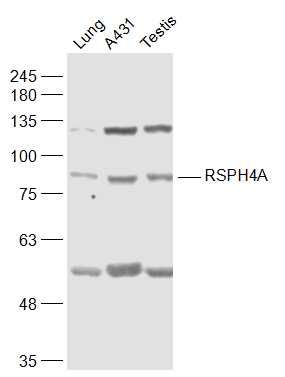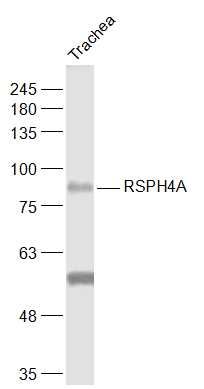RSPH4A Polyclonal Antibody
Purified Rabbit Polyclonal Antibody (Pab)
- SPECIFICATION
- CITATIONS
- PROTOCOLS
- BACKGROUND

Application
| WB, IHC-P, IHC-F, IF, ICC, E |
|---|---|
| Primary Accession | Q5TD94 |
| Reactivity | Rat, Pig, Dog, Bovine |
| Host | Rabbit |
| Clonality | Polyclonal |
| Calculated MW | 81 KDa |
| Physical State | Liquid |
| Immunogen | KLH conjugated synthetic peptide derived from human RSPH4A/RSHL3 |
| Epitope Specificity | 435-482/716 |
| Isotype | IgG |
| Purity | affinity purified by Protein A |
| Buffer | 0.01M TBS (pH7.4) with 1% BSA, 0.02% Proclin300 and 50% Glycerol. |
| SUBCELLULAR LOCATION | Cytoplasm; cytoskeleton; cilium axoneme. Radial spoke. |
| SIMILARITY | Belongs to the flagellar radial spoke RSP4/6 family. |
| DISEASE | Defects in RSPH4A are the cause of primary ciliary dyskinesia type 11 (CILD11) [MIM:612649]. CILD is an autosomal recessive disorder characterized by axonemal abnormalities of motile cilia. Respiratory infections leading to chronic inflammation and bronchiectasis are recurrent, due to defects in the respiratory cilia; reduced fertility is often observed in male patients due to abnormalities of sperm tails. Half of the patients exhibit situs inversus, due to dysfunction of monocilia at the embryonic node and randomization of left-right body asymmetry. Primary ciliary dyskinesia associated with situs inversus is referred to as Kartagener syndrome. |
| Important Note | This product as supplied is intended for research use only, not for use in human, therapeutic or diagnostic applications. |
| Background Descriptions | RSHL3 is predicted to be a component of the radial spoke head based on homology with proteins in the biflagellate alga Chlamydomonas reinhardtii and other ciliates. RSHL3 (radial spoke head-like protein 3), also known as radial spoke head protein 4 homolog A, is a 716 amino acid protein that belongs to the flagellar radial spoke RSP4/6 family. Mutations in the RSHL3 gene cause primary ciliary dyskinesia 1, a disease arising from dysmotility of motile cilia and sperm. Existing as three alternatively spliced isoforms, the RSHL3 gene contains 6 exons, is conserved in chimpanzee, dog, cow, mouse, rat, chicken, zebrafish, fruit fly and P.falciparum, and maps to human chromosome 6q22.1. |
| Gene ID | 345895 |
|---|---|
| Other Names | Radial spoke head protein 4 homolog A, Radial spoke head-like protein 3, RSPH4A, RSHL3 |
| Target/Specificity | Defects in RSPH4A are the cause of primary ciliary dyskinesia type 11 (CILD11) [MIM:612649]. CILD is an autosomal recessive disorder characterized by axonemal abnormalities of motile cilia. Respiratory infections leading to chronic inflammation and bronchiectasis are recurrent, due to defects in the respiratory cilia; reduced fertility is often observed in male patients due to abnormalities of sperm tails. Half of the patients exhibit situs inversus, due to dysfunction of monocilia at the embryonic node and randomization of left-right body asymmetry. Primary ciliary dyskinesia associated with situs inversus is referred to as Kartagener syndrome. |
| Dilution | WB=1:500-2000,IHC-P=1:100-500,IHC-F=1:100-500,ICC=1:100-500,IF=1:100-500,ELISA=1:5000-10000 |
| Format | 0.01M TBS(pH7.4), 0.09% (W/V) sodium azide and 50% Glyce |
| Storage | Store at -20 ℃ for one year. Avoid repeated freeze/thaw cycles. When reconstituted in sterile pH 7.4 0.01M PBS or diluent of antibody the antibody is stable for at least two weeks at 2-4 ℃. |
| Name | RSPH4A |
|---|---|
| Synonyms | RSHL3 |
| Function | Component of the axonemal radial spoke head which plays an important role in ciliary motility (PubMed:19200523). Essential for triplet radial spokes (RS1, RS2 and RS3) head assembly in the motile cilia (By similarity). |
| Cellular Location | Cytoplasm, cytoskeleton, cilium axoneme. Cell projection, cilium |
| Tissue Location | Expressed in trachea, lungs, and testes (PubMed:23993197). Very strong expression is detected in nasal brushings (PubMed:19200523). |

Thousands of laboratories across the world have published research that depended on the performance of antibodies from Abcepta to advance their research. Check out links to articles that cite our products in major peer-reviewed journals, organized by research category.
info@abcepta.com, and receive a free "I Love Antibodies" mug.
Provided below are standard protocols that you may find useful for product applications.
If you have used an Abcepta product and would like to share how it has performed, please click on the "Submit Review" button and provide the requested information. Our staff will examine and post your review and contact you if needed.
If you have any additional inquiries please email technical services at tech@abcepta.com.













 Foundational characteristics of cancer include proliferation, angiogenesis, migration, evasion of apoptosis, and cellular immortality. Find key markers for these cellular processes and antibodies to detect them.
Foundational characteristics of cancer include proliferation, angiogenesis, migration, evasion of apoptosis, and cellular immortality. Find key markers for these cellular processes and antibodies to detect them. The SUMOplot™ Analysis Program predicts and scores sumoylation sites in your protein. SUMOylation is a post-translational modification involved in various cellular processes, such as nuclear-cytosolic transport, transcriptional regulation, apoptosis, protein stability, response to stress, and progression through the cell cycle.
The SUMOplot™ Analysis Program predicts and scores sumoylation sites in your protein. SUMOylation is a post-translational modification involved in various cellular processes, such as nuclear-cytosolic transport, transcriptional regulation, apoptosis, protein stability, response to stress, and progression through the cell cycle. The Autophagy Receptor Motif Plotter predicts and scores autophagy receptor binding sites in your protein. Identifying proteins connected to this pathway is critical to understanding the role of autophagy in physiological as well as pathological processes such as development, differentiation, neurodegenerative diseases, stress, infection, and cancer.
The Autophagy Receptor Motif Plotter predicts and scores autophagy receptor binding sites in your protein. Identifying proteins connected to this pathway is critical to understanding the role of autophagy in physiological as well as pathological processes such as development, differentiation, neurodegenerative diseases, stress, infection, and cancer.



